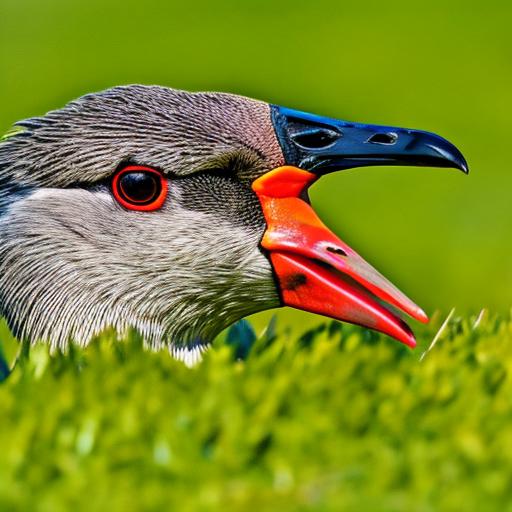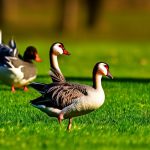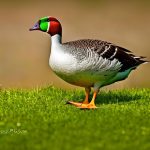Having geese on your property can be a nuisance. They can cause damage to your lawn, leave droppings everywhere, and even become aggressive towards humans or other animals. Fortunately, there are several methods that can be used to control geese and keep them away from your property. In this article, we will explore different strategies for geese control and provide tips on how to effectively implement them.
Key Takeaways
- Geese are social animals and tend to congregate in areas with water and food sources.
- Physical barriers such as fences and netting can be effective in keeping geese away from certain areas.
- Decoys that resemble predators or other geese can deter geese from settling in an area.
- Sound and light deterrents such as sirens and strobe lights can be effective in scaring geese away.
- Removing food sources such as grass clippings and fallen fruit can discourage geese from staying in an area.
Understanding the behavior of geese
Before we delve into the various methods of geese control, it is important to understand the habits and behavior of these birds. Geese are social animals that prefer to live in groups, known as flocks. They are attracted to areas that provide them with food, water, and shelter. Geese are also known for their territorial behavior, especially during nesting season. They will defend their nesting sites aggressively, which can pose a problem if they choose your property as their nesting ground.
Installing physical barriers to deter geese
One effective method of geese control is the installation of physical barriers. These barriers can prevent geese from accessing certain areas of your property, such as ponds or lawns. There are different types of physical barriers that can be used, including fences, netting, and floating barriers. Fences should be at least three feet high and have small openings to prevent geese from squeezing through. Netting can be used to cover ponds or other water bodies to prevent geese from landing on them. Floating barriers can be placed in water bodies to create an obstacle for geese.
When installing physical barriers, it is important to ensure that they are properly maintained. Regularly check for any damages or gaps in fences or netting and repair them promptly. Keep an eye out for any signs of geese attempting to breach the barriers and take appropriate action.
Using decoys to keep geese away
Another method of geese control is the use of decoys. Decoys are objects that resemble geese and can be used to deter them from landing or nesting on your property. There are different types of decoys available, including stationary decoys and motion decoys. Stationary decoys are placed in strategic locations to create the illusion of a flock of geese. Motion decoys, on the other hand, have moving parts that mimic the movements of real geese.
To use decoys effectively, it is important to place them in areas where geese are likely to land or nest. Move the decoys around periodically to create the impression of an active flock. It is also important to regularly clean and maintain the decoys to ensure they remain effective.
Implementing sound and light deterrents
Sound and light deterrents can also be effective in keeping geese away from your property. These deterrents work by creating a sense of danger or discomfort for the geese, making them less likely to stay in the area. There are different types of sound and light deterrents available, including sonic devices, strobe lights, and laser pointers.
When using sound deterrents, it is important to vary the sounds to prevent geese from becoming accustomed to them. Place the devices strategically around your property, focusing on areas where geese are likely to gather or nest. Light deterrents can be used in a similar manner, with strobe lights or laser pointers being pointed towards areas where geese are unwanted.
Removing food sources to discourage geese

Geese are attracted to areas that provide them with ample food sources. By removing these food sources, you can discourage geese from staying on your property. Common food sources for geese include grass, grains, and aquatic plants. Regularly mow your lawn to keep it short and remove any fallen grains or seeds from bird feeders. If you have a pond or water body on your property, consider using a pond aerator to prevent the growth of aquatic plants that geese feed on.
Planting unappealing vegetation for geese
Another way to discourage geese from your property is by planting vegetation that they do not like. Geese prefer open areas with short grass, so planting tall grasses or shrubs can make your property less attractive to them. Consider planting species such as switchgrass, fountain grass, or juniper bushes. These plants have dense foliage and can provide cover for other wildlife while deterring geese.
When planting unappealing vegetation, it is important to consider the specific needs of the plants and ensure they are suitable for your climate and soil conditions. Regularly maintain the vegetation by pruning or trimming as needed to keep it healthy and effective in deterring geese.
Creating alternate water sources for geese
Geese are attracted to water bodies for feeding and nesting purposes. By creating alternate water sources, you can divert their attention away from your property. Consider installing a small pond or birdbath in an area away from your main property. This will provide a water source for other wildlife while discouraging geese from staying on your property.
When creating alternate water sources, it is important to regularly clean and maintain them to prevent the growth of algae or other unwanted vegetation. Keep the water source shallow to discourage geese from nesting in it.
Enlisting the help of trained dogs
Trained dogs can be highly effective in controlling geese on your property. Dogs are natural predators to geese and their presence can deter them from landing or nesting. There are specific breeds of dogs that are commonly used for geese control, such as Border Collies or Labrador Retrievers.
To effectively use trained dogs for geese control, it is important to properly train them and establish clear boundaries for their work area. Regularly exercise and socialize the dogs to ensure they remain effective in deterring geese. It is also important to provide them with proper care and attention to maintain their health and well-being.
Seeking professional assistance for geese control
If you are unable to effectively control geese on your property using the methods mentioned above, it may be beneficial to seek professional assistance. Professional wildlife control companies have the knowledge and experience to effectively manage geese populations and implement appropriate control measures. They can assess your property, identify the specific issues you are facing, and provide tailored solutions.
When seeking professional assistance, it is important to research and find reputable companies in your area. Ask for recommendations from friends or neighbors who have dealt with similar issues. Obtain multiple quotes and compare the services offered before making a decision.
Maintaining a regular maintenance routine for your property
Once you have implemented the necessary measures to control geese on your property, it is important to maintain a regular maintenance routine. Regularly inspect your property for any signs of geese or damage caused by them. Repair any damages to physical barriers or decoys promptly. Remove any fallen grains or seeds from bird feeders and regularly mow your lawn to keep it short.
By maintaining a regular maintenance routine, you can ensure that the methods you have implemented remain effective in deterring geese from your property.
Controlling geese on your property can be challenging, but with the right strategies and techniques, it is possible to keep them away. By understanding the behavior of geese and implementing physical barriers, decoys, sound and light deterrents, removing food sources, planting unappealing vegetation, creating alternate water sources, enlisting the help of trained dogs, seeking professional assistance, and maintaining a regular maintenance routine, you can effectively control geese populations on your property. Take action today to protect your property from the nuisance and damage caused by geese.
If you’re looking for effective ways to keep geese off your grass, you might also be interested in learning about the importance of a well-designed chicken coop. A properly designed coop not only provides a safe and comfortable environment for your chickens but can also help deter geese from invading your property. Check out this informative article on poultrywizard.com to discover the key features and considerations when building or choosing a chicken coop that can help keep geese away from your grass.
FAQs
What are some effective ways to keep geese off my grass?
There are several effective ways to keep geese off your grass, including using decoys, installing fencing, using repellents, and modifying the landscape.
What kind of decoys can I use to keep geese away?
You can use a variety of decoys to keep geese away, including fake predators like owls or coyotes, or even fake geese.
What kind of fencing is best for keeping geese off my grass?
A fence that is at least 3-4 feet tall and has small mesh or wire spacing is best for keeping geese off your grass.
What kind of repellents can I use to keep geese away?
There are several types of repellents you can use to keep geese away, including visual repellents like reflective tape or scarecrows, and auditory repellents like loud noises or distress calls.
How can I modify my landscape to keep geese away?
You can modify your landscape by removing any standing water or other sources of food or shelter that may attract geese, and by planting vegetation that geese do not like to eat.
Meet Walter, the feathered-friend fanatic of Florida! Nestled in the sunshine state, Walter struts through life with his feathered companions, clucking his way to happiness. With a coop that’s fancier than a five-star hotel, he’s the Don Juan of the chicken world. When he’s not teaching his hens to do the cha-cha, you’ll find him in a heated debate with his prized rooster, Sir Clucks-a-Lot. Walter’s poultry passion is no yolk; he’s the sunny-side-up guy you never knew you needed in your flock of friends!







